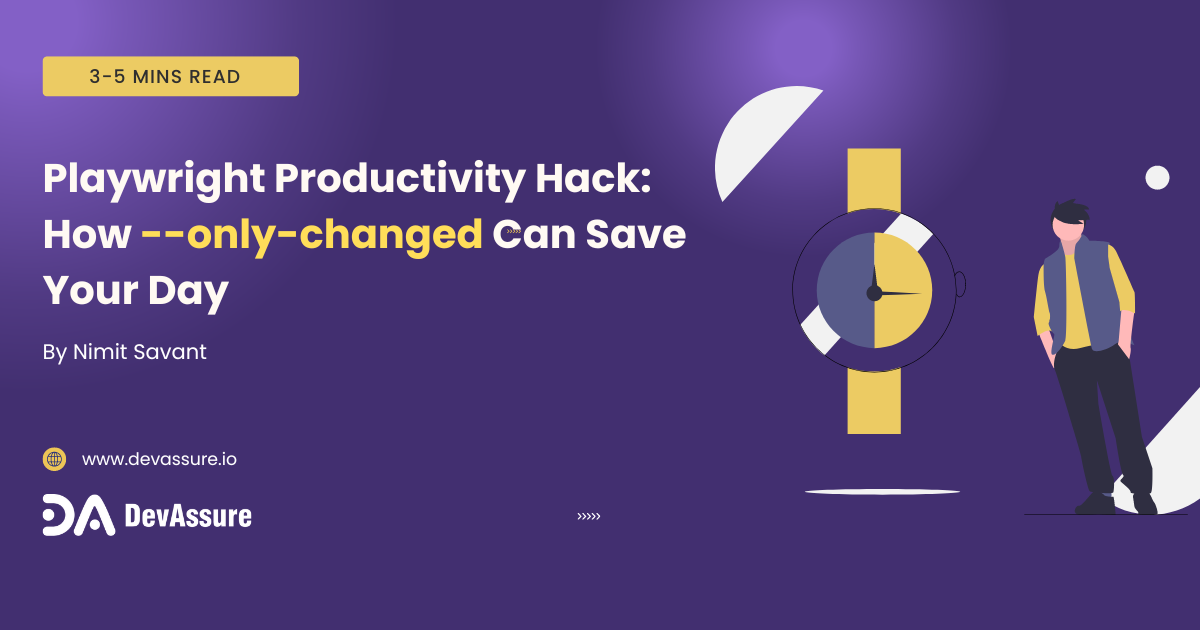Playwright Productivity Hack: How --only-changed Can Save Your Day
 Nimit Savant
Nimit Savant
Introduction
Brief overview of Playwright:
Playwright is a testing library for automating web browsers. It supports Chromium, Firefox, and WebKit browsers, providing a unified API for interacting with web pages across different browsers.
Read more in this blog -> Playbook Blog
Importance of quick iterations in testing with
--only-changedFocus on the test case at hand
Focus on affected test cases
Less time wasted in iterating all the test cases or selecting and iterating the test cases
Understanding the --only-changed option
What it does:
Improves Efficiency: By running only the necessary tests, you can significantly reduce the time it takes to execute your test suite, especially for large projects with many tests.
Reduces Noise: Focusing on changed tests can help you identify the root cause of issues more quickly, as you can eliminate irrelevant tests from the equation.
When to use it:
Large Test Suites: For projects with large test suites, using --only-changed can dramatically reduce the time it takes to run all your tests.
Continuous Integration: As part of your continuous integration pipeline, using
--only-changedcan help you reduce the time it takes to run your tests and identify issues early in the development process.
Implementing --only-changed
Basic syntax
npx playwright test --only-changed #basicAdvance use cases
Iterating test cases against a branch:
main,developmentIterating test cases since the a specific commit
npx playwright test --only-changed=<branch-name> npx playwright test --only-changed=<commit-number>
Benefits of using --only-changed
Use when you've changed constants and wanted to see the affected test cases
When you want to run tests that you changed since last commit
Run tests faster for affected changes in your new branch
Example you're on a new branch
new-branchand want to run test cases which are just in your new branch against yourmainnpx playwright test --only-changed=mainwill only run test cases which are different from the latest commit onmainbranch
Running test cases since a commit in timeline
Example if you want to run test cases which were affected since last two commits; copy the commit id from your history
git log -2to check the second last commitnpx playwright test --only-changed=e2245ff672bb618c485b793c3c258064a67f6025
Potential pitfalls and how to avoid them
Incorrect Change Detection:
Dependency Changes: Changes in dependencies or external libraries might not be reflected accurately if they don't directly impact the test files.
Formatting Changes: Minor formatting changes (e.g., whitespace, indentation) might lead to unnecessary test re-runs, especially if your version control system strictly enforces formatting rules.
Flaky Tests: Flaky tests (tests that fail intermittently) can lead to false positives or negatives, making it difficult to determine if a change is actually causing a problem.
Dependency Conflicts: Conflicting dependencies between tests can cause unexpected behaviour and make it difficult to pinpoint the root cause of changes.
Conclusion
This article provides a comprehensive guide on using the --only-changed option in Playwright to speed up test iterations by running only the tests affected by recent changes. It explains the importance of quick iterations in testing, the setup required, and the benefits of this option. Additionally, it covers practical examples, including running tests changed since the last commit or specific branches, and addresses potential pitfalls and solutions. Encouragement is given to integrate this option into regular workflows for efficient testing.
Ending Note
--only-changed if used the right way in your organisation can save a lot of efforts and running and iterating tests faster. Good planning and well defined use case for your project would really help your team to excel.
Join Community
You can read more about this on DevAssure’s Community Page. Click on the banner below to redirect to Community Page.
Subscribe to my newsletter
Read articles from Nimit Savant directly inside your inbox. Subscribe to the newsletter, and don't miss out.
Written by

Nimit Savant
Nimit Savant
Developer Advocate 🥑 DevAssure I love to talk about Open Source tools, JS Ecosystem and recently about Quality Assurance and Automation Testing 🧪 I like to bridge the gap between product and it's developer audience
